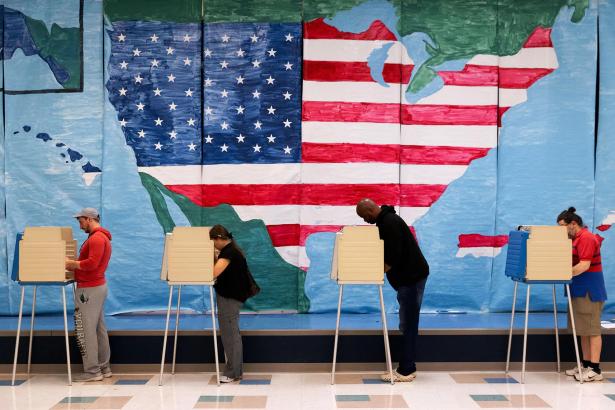Watching the returns from the Iowa Republican caucus this week, I felt the usual excitement of the start of a presidential campaign, plus a bit of nostalgia.
Four years ago this month, The 19th launched just days before the Democratic primary in Iowa; then, I was our newsroom’s sole reporter, and our goal was to fundamentally change how we covered gender and American politics.
Today, the future of our democracy is in doubt as we head into November. Still, our mission remains the same between now and Election Day: to leave behind a more honest, inclusive and accurate record of who and where we are as a country.
What are the stakes for 2024? What are the dynamics that could drive voters to — or away from — the polls? Much of what we will learn will come not from the candidates, whom we have had months, if not years, to get to know. It will come from the people who participate in and who will be impacted by this election.
While I don’t make predictions about election results, I do think about what narratives I believe will shape this year. Coming out of Iowa, caucusgoers confirmed a major theme I’ve been thinking about in a month where we mark the anniversary of the January 6, 2021, insurrection; the birthday of civil and voting rights leader Martin Luther King Jr.; and the anniversary of the Supreme Court’s decision in Roe v. Wade.
It is the perennial declaration of political journalists that the current presidential election is the most consequential so far. That has been true in previous years for different reasons, and it’s true this year because in 2024, we get the democracy we vote for.
On Monday, Iowa Republicans sent a message that they want a democracy led by someone who has shown little regard for its customs and norms.
Former President Donald Trump is seeking a return to office after attempting to overturn the results of a free and fair election — aided by his supporters who led an insurrection at the United States Capitol. Trump currently enjoys front-runner status despite having been found liable for sexual assault and defamation and facing 91 felony counts across four criminal cases proceeding alongside the campaign.

Barring any major surprises, he will face an incumbent president who was already the oldest person ever elected to the office. In 2020, Joe Biden ran a campaign framed as “a battle for the soul of America,” but his pitch for national unity has been largely rejected. A racial reckoning, the end of federal protections for abortion, and culture wars over education and LGBTQ+ rights have helped to only further divide the country Biden hopes to continue to lead.
But the presidential race will not be the only barometer of how Americans prioritize democracy. Candidates up and down the ballot — from Congress to secretaries of state, to local government leaders, all with the ability to restrict or expand voting rights — continue to embrace the lie of a stolen 2020 election.
Voters in some states will also get to exercise direct democracy, with efforts to get measures on abortion access on the ballot in at least 11 states.
No matter your issues — the economy, health care, education, climate change, immigration, gun violence — none are more important than the survival of democracy. Without it, none of the issues matter, because they cannot be debated or legislated. I said last year that democracy must be a kitchen table issue for voters, but they must also see how democracy intersects with traditional political priorities.
Will democracy be a topic on the debate stage and campaign trail? Will journalists probe how voters in key primary and general election battleground states see their rights and our government? Our understanding of how voters view and value democracy — and how much importance they place on the issue as a value for their chosen candidate — will be key in understanding voter behavior at the ballot box.
Four years ago, I accurately wrote that, as more than half of the population and the electorate, women would be the deciders of the election. With the issue of rights, freedom and gender on the ballot, we have seen women galvanized to make their voices heard at the polls over the last four years. This year, I’ll be paying attention to which women will shape 2024 — and how.
Black women voters and organizers are feeling disrespected and devalued in a political climate that has made them a prime target in the diversity, equity and inclusion culture wars. In 2020, they worked twice as hard for a democracy that many feel has given them half as much, despite wins that included the first Black women to serve as vice president and on the Supreme Court. But will they show up anyway, if not for Biden and Vice President Kamala Harris, for democracy and for each other?
For White women: Will they align with their race or their gender in the first presidential election after the Supreme Court’s 2022 decision in Dobbs v. Jackson Women’s Health Organization? While a majority of women overall have preferred the Democratic candidate in presidential elections since 1996, a majority of White women have voted for the GOP presidential candidate for nearly a generation. Will we continue to see divides along education, geographic and generational lines?
White women — Gen Z and millennials in particular — “are voting their gender in a way that we’ve never seen before,” said Taylor Salditch, the executive director of Supermajority, a progressive political organizing group.
“We do have the power to dull the voices of the percentage of older White women who, frankly, were not well organized when they were coming up, or they were organized by the other side,” Salditch said. “I don’t think that White women voting their gender is a foregone conclusion. I think it actually requires organizing.”
The electorate continues to diversify, especially in key states, and with it the voters who get to define what democracy means to them. For Latina, Asian-American and Native women voters — many of whom also see their rights and freedoms as under threat — their lived experiences could inform how they head to the polls.
Both parties are approaching 2024 as a matter of unfinished business. Four years into my role at The 19th and more than a century after the passage of the amendment for which our newsroom is named, I’m approaching this election as part of the unfinished business of our democracy. Who gets to participate fully in our political process is among the most urgent questions of this cycle. The results feel existential to the young, people of color, LGBTQ+ Americans and many others whose fates could depend on who all of us elect to create policy in all of our names.
Meeting this moment, as journalists and as voters, is what democracy requires of us. We won’t get to Election Day — or whatever comes next — without each other.
Errin Haines is our editor-at-large. An award-winning journalist with nearly two decades of experience, Errin was previously a national writer on race for the Associated Press. She’s also worked at the Los Angeles Times and the Washington Post. Sign up for her biweekly newsletter, The Amendment, for unique analysis reframing the political landscape. Errin Haines's work is free to consume and free to republish because of contributions from readers like you. A donation of $19 goes a long way toward sustaining our nonprofit newsroom.
The 19th is a nonprofit newsroom supported by a mix of membership, philanthropy and corporate underwriting. Our goal is long-term sustainability to support a lasting future for news and information at the intersection of gender, politics and policy. Donors and sponsors don’t get a thumb on the scale; they play no role in our journalism, in our storytelling or in the planning and execution of our events. Become a Member


Spread the word